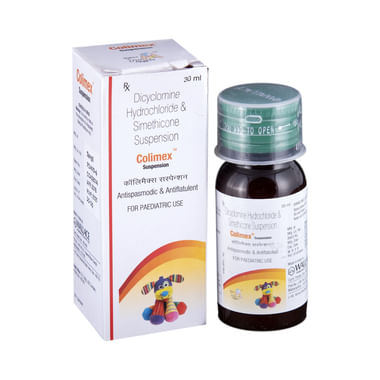-
Colimex Syrup (Rs.62.81)
Composition: Dicyclomine (10mg/5ml) + Dimethicone (40mg/5ml)
-
Mefsaid D Syrup (Rs.35)
Composition: Dicyclomine (10mg/5ml) + Dimethicone (40mg/5ml)
All Details About Colimex Suspension
Find out detailed description, uses, directions of use, side effects, warnings and precautions, frequently asked questions about Colimex Suspension
Description:
Colimex Suspension helps treat stomach pain, bloating, and abdominal cramps caused due to acidity, gas, infections, or diseases of the gastrointestinal tract in children. It works by relaxing the muscles of the gut and absorbing extra gas. Colimex Suspension also helps control the symptoms of irritable bowel syndrome.Donate the prescribed dose of Colimex Suspension to your child orally after a meal or as suggested by the doctor. Your child’s doctor may prescribe this medicine for a few days to many days. Do not abruptly stop the medicine by yourself, as it may bring back the symptoms or worsen your child’s condition.
Some common side effects of this medicine include nausea, dryness in the mouth, dizziness, and vision problems. If these occur, they will subside once your child’s body adapts to the medicine. In case these side effects do not improve or become bothersome for your child, reach out to the doctor on a priority basis.
You must let your child’s doctor know about all the medicines your child is being given. Also, inform the doctor of any previous history of allergy, intolerance to any food products, abdominal obstruction, liver impairment, kidney malfunction, or any birth defects. This information is very important for dose alterations and for planning your child’s overall treatment.
Directions For Use:
Take this medicine in the dose and duration as advised by your doctor. Check the label for directions before use. Measure it with a measuring cup and take it by mouth. Shake well before use. Colimex Suspension is to be taken with food.Side Effects:
Colimex Suspension does not pose serious side effects and is well-tolerated by children. In case the side effects do occur, they’re likely to subside once the body adapts to the medicine. Consult your child’s doctor if these side effects persist or bother your child. The most common side effects include-Ordinary side effects of Colimex
- Nausea
- Blurred vision
- Tenseness
- Dryness in mouth
- Dizziness
- Sleepiness
- Weakness
Warning & Precautions:
FAQs:
My child is having abdominal pain associated with nausea, vomiting, and sensitivity to light. Is Colimex Suspension safe in such a case?
What all tests do my child need to undergo if he has abdominal pain?
In which all diseases should Colimex Suspension be avoided?
Can other medicines be given at the same time as Colimex Suspension?
How should Colimex Suspension be stored?
Written by:
Dr. T. Sharmila Krishna
M.B.B.S., MD (Biochemistry)
Reviewed by:
Dr. Sureshbabu Yadav
M.B.B.S., DIP.DIAB, F.R.S.H
Disclaimer:
Getomeds primary intention is to ensure that its consumers get information that is reviewed by experts, accurate, and trustworthy. The information and contents of this website are for informational purposes only. They are not intended to be a substitute for professional medical advice, diagnosis, or treatment. Please seek the advice of your doctor and discuss all of your concerns about any disease or medication. Do not disregard or postpone seeking professional medical advice because of something you read on Getomeds. Our mission is to support, not replace, the doctor-patient relationship.
